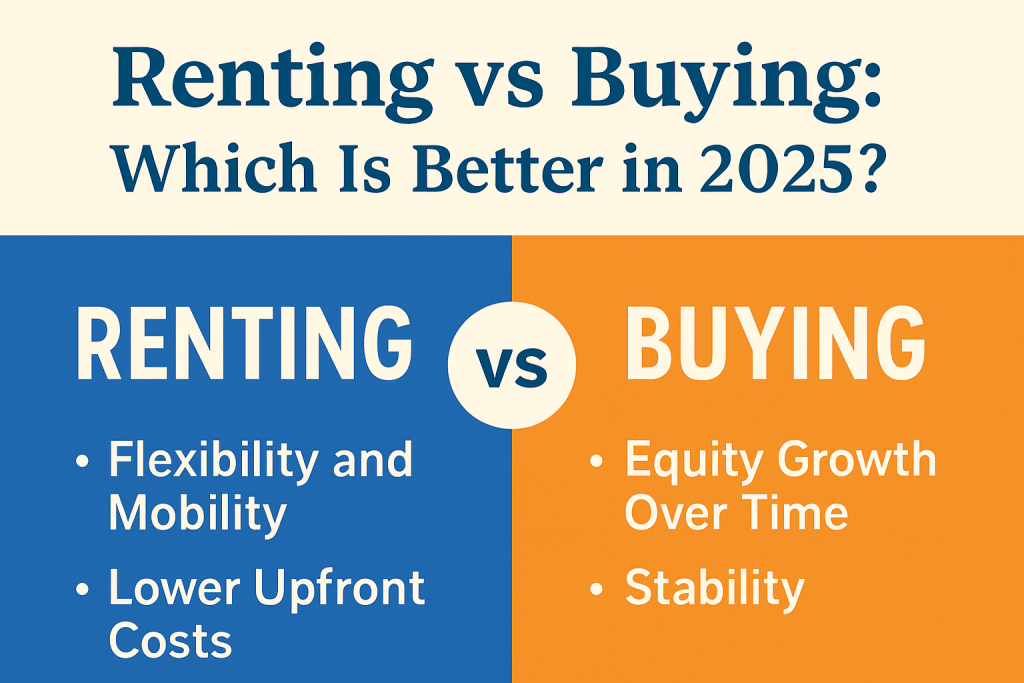Should you rent or buy a home in 2025? It’s one of the most common real estate questions in the U.S. today—and for good reason. With mortgage rates, home prices, and rent prices fluctuating, many Americans are reevaluating their options. Whether you’re a first-time homebuyer, a renter thinking about investing, or simply navigating this complex housing market, this guide will help you weigh the pros and cons of renting vs buying in 2025.

Current Housing Market Trends in 2025
The U.S. housing market in 2025 continues to be shaped by high interest rates, inflation concerns, and limited housing inventory in major cities. As a result, both rent and home prices remain elevated. However, new construction projects and changing work-from-home trends are slowly shifting demand to suburban and smaller metro areas.
Renting a Home in 2025: Pros and Cons
✅ Pros of Renting in 2025
- Flexibility and Mobility
Renting is ideal for people who expect to relocate for work, education, or lifestyle. You’re not tied to a mortgage or long-term commitment. - Lower Upfront Costs
Renters avoid hefty down payments, closing costs, and property taxes. Security deposits are much smaller compared to buying a house. - No Maintenance Responsibilities
Landlords typically handle repairs and upkeep, saving you time and money. - Access to Amenities
Many rental communities offer fitness centers, pools, and security—often without extra costs.
❌ Cons of Renting in 2025
- No Equity Building
Monthly rent payments don’t contribute to home equity or future wealth. - Rent Increases
With inflation still impacting the market, rent prices may rise unexpectedly each year. - Limited Control
Renters can’t remodel or fully customize their living space. Landlords also have the right to terminate leases or sell the property.
Buying a Home in 2025: Pros and Cons
✅ Pros of Buying in 2025
- Equity Growth Over Time
Each mortgage payment helps you build ownership. Real estate remains one of the best long-term investments. - Stability
Homeownership offers consistent monthly payments (if you have a fixed-rate mortgage) and long-term security. - Tax Benefits
Mortgage interest, property taxes, and some closing costs may be deductible. - Freedom to Customize
As a homeowner, you can remodel, repaint, and upgrade your home to your liking. - Potential Rental Income
If you buy a multi-family home or have extra space, you can generate passive income by renting it out.
❌ Cons of Buying in 2025
- High Upfront Costs
Down payments (usually 3%-20%), inspection fees, closing costs, and moving expenses add up quickly. - Maintenance and Repairs
You’re responsible for all upkeep, which can be costly and time-consuming. - Less Flexibility
Selling a home can take time, and moving is harder with property ownership.
Key Factors to Consider Before Deciding
1. Financial Readiness
Can you afford a down payment and monthly mortgage payments? Use tools like a home affordability calculator to assess your budget.
2. Location & Lifestyle
In fast-growing metro areas like Austin, Phoenix, and Miami, rent prices are increasing rapidly. Buying may offer long-term savings if you plan to stay.
3. Job Stability
A secure job makes homeownership less risky. If you’re in a volatile industry or frequently move, renting is often safer.
4. Long-Term Goals
Do you plan to settle down, build equity, and customize your space? Or do you prefer the freedom to move?
Renting vs Buying: Which is Cheaper in 2025?
In many parts of the U.S., monthly rents have exceeded average mortgage payments—especially in suburban neighborhoods. However, the initial cost of buying a home is still a major barrier for many.
In cities like New York, San Francisco, and Los Angeles, renting may still be more affordable in the short term. But in secondary cities and the Midwest, buying can be more cost-effective long-term.
Expert Tips for 2025 Housing Decisions
- Use a Rent vs Buy Calculator
Online tools can help you evaluate monthly payments, break-even points, and total cost comparisons. - Get Pre-Approved for a Mortgage
Knowing your loan eligibility helps you plan and make competitive offers. - Explore First-Time Homebuyer Programs
Many states offer grants, lower interest rates, and assistance for first-time buyers. - Consider Hybrid Options
Rent-to-own homes or co-buying with friends/family are trending in 2025 as creative solutions.
Final Verdict: Should You Rent or Buy in 2025?
There’s no one-size-fits-all answer. Renting is better for those who value flexibility, lower upfront costs, or plan to relocate soon. Buying a home is better for people seeking long-term investment, stability, and financial growth.
Evaluate your financial health, lifestyle needs, and long-term goals. In 2025, the smarter choice is the one that fits your situation.






Leave a Reply